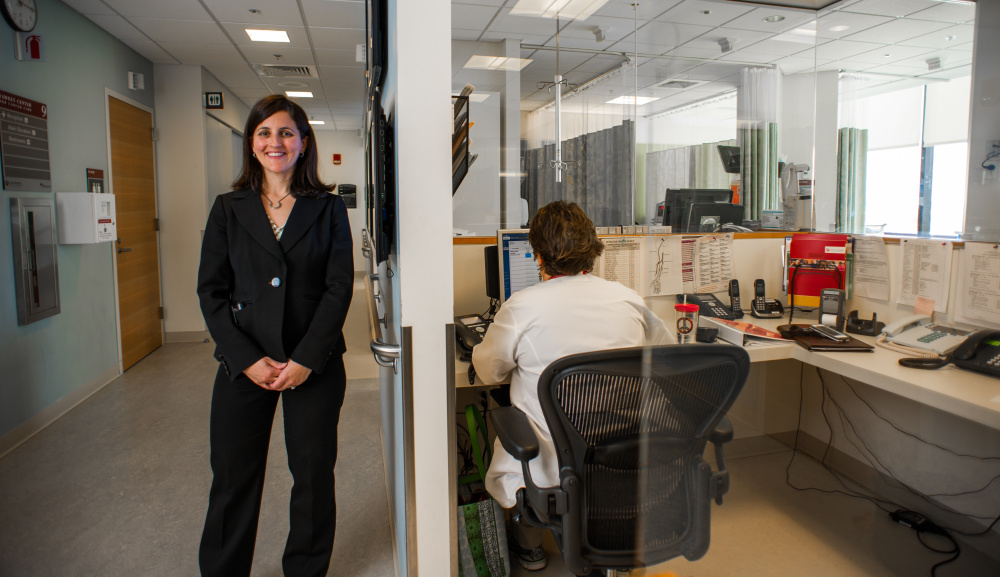
Following surgery and/or radiation for early stage breast cancer, chemotherapy is sometimes given to eliminate remaining cancer cells that could cause trouble later. Traditionally, women have been more likely to undergo follow-up chemotherapy if clinical and pathological factors suggested a significant risk of recurrence, such as a larger tumor, higher stage and pathological grade of the cancer, or more lymph nodes containing cancer cells.
In the past 10 years, genomic tests such as Oncotype DX and MammaPrint have brought a precision medicine approach to predicting recurrence risk; the tests look at a “signature” of gene activity to gauge the odds that remaining cancer cells will later spread through the body and threaten life. These genomic profile tests are performed on cancerous tissue collected during breast surgery, and look at a “signature” of gene activity. By monitoring the tissue’s genetic signature, the tests help estimate how much chemotherapy might lower the risk that cancer will return.
Women who have low scores on these tests are considered at lower risk of recurrence, and the benefits of chemotherapy beyond that provided by pills that block or lower hormones (for cancers that are sensitive to the influences of hormones) may be minimal.
But what about women who fall into a gray area? In some patients, clinical and pathological indicators point to a recurrence risk great enough to strongly consider chemotherapy. At the same time, genomic tests of the same women’s tumors may predict a low recurrence risk and no chemotherapy benefit, not worth subjecting the patient to the side effects of additional treatment.
A large study published last August in the New England Journal of Medicine on this question recently found that women in this mixed group fared about the same whether or not they received chemotherapy. Even though their treated tumor may have had aggressive-looking features, if its genomic profile on the MammaPrint test was low-risk, the cancer was unlikely to spread – with or without chemotherapy.
At five years, the survival rate of women without distant metastases was 94.7 percent among those who did not receive chemotherapy – just 1.5 percent lower than those women who received chemotherapy. “Given these findings, approximately 46 percent of women with breast cancer who are at high clinical risk might not require chemotherapy,” said the authors of the study, called MINDACT.
“This study, among others, continues to show the importance of tumor genomics and biology when making decisions about treatment,” says Rachel Freedman, MD, MPH, a breast oncologist in the Susan F. Smith Center for Women’s Cancers at Dana-Farber.
Learn More:
The study involved 6,693 women ages 18 to 70 at 112 institutions in nine European countries. They had primary invasive breast cancer, stage TI or TII or operable TIII, and up to three positive lymph nodes under the arm.
“Deciding whether or not chemotherapy should be a part of a patient’s treatment plan is an individualized discussion based on the anticipated risk for recurrence, expected benefits of treatment, competing risks from other medical conditions, and personal preferences,” notes Freedman.
“Traditionally, we had only the clinical features of a cancer to inform treatment recommendations, but now we increasingly incorporate the biology and/or genetic features of a cancer as well,” she continues. “This improved understanding of who is and isn’t expected to benefit from chemotherapy has spared many women from receiving this treatment unnecessarily. This study adds to the growing body of evidence that a substantial number of women with breast cancer will not need to receive chemotherapy to do well.”

As a patient on breast cancer survival websites, I can tell you there are many misunderstandings about recurrence scores. I had the Oncotype DX test, and I must say their website is not much help.
First, most people do not understand that their scores are predicated on their undergoing hormone blocking therapy, such as AIs or tamoxifen. I’ve seen people decide to drop AIs because of the side effects “because I have a low recurrence score”. The point that these numbers are only useful IF treatment is continued needs to be better emphasized.
Also, as someone who skipped chemo with a recurrence score of 12, I’m now facing a similar issue: side effects of letrozole have had a hugely negative impact on my quality of life. Under my oncologist ‘s guidance I have taken a break from this drug and verified that it was indeed the source of my problems (and some I hadn’t noticed). She has prescribed another AI, exestemane (?), the one AI significantly different from letrozole. Unfortunately like a huge swath of Americans I have high deductibles and this drug priced out at $485 for 90 days. So now I’m attempting to weigh the cost of the drug against its benefits, and the recurrence score is not helpful. I’m told my cancer was highly hormone sensitive- is this the reason the recurrence score is so low, given that it assumes hormone suppression? I cannot find data that adjust for no AI.